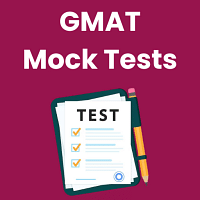GMAT Exam > GMAT Questions > What are the question types in the GMAT Criti...
Start Learning for Free
What are the question types in the GMAT Critical Reasoning section, and how can I prepare for them?
Most Upvoted Answer
What are the question types in the GMAT Critical Reasoning section, an...
Question Types in GMAT Critical Reasoning Section
There are several question types that can appear in the GMAT Critical Reasoning section. Familiarizing yourself with these question types and understanding their specific characteristics can help you prepare effectively for this section. Here are some of the common question types:
1. Strengthen/Weaken: These questions require you to identify an answer choice that either strengthens or weakens the argument presented in the passage.
2. Assumption: Assumption questions ask you to identify an answer choice that is necessary for the argument to hold true.
3. Inference: Inference questions require you to draw a logical conclusion based on the information provided in the passage.
4. Evaluate: These questions ask you to determine the impact of a specific piece of information on the argument's validity.
5. Boldface: Boldface questions require you to identify the role played by specific statements in the argument.
6. Paradox: Paradox questions present a situation that seems contradictory or counterintuitive, and you must select the answer choice that best resolves the apparent paradox.
7. Flaw: Flaw questions ask you to identify the logical flaw or weakness in the argument.
8. Resolve: These questions ask you to choose an answer choice that resolves a discrepancy or conflict within the passage.
Preparing for GMAT Critical Reasoning Questions
To effectively prepare for the GMAT Critical Reasoning section, consider the following strategies:
1. Understand Argument Structure: Familiarize yourself with the structure of arguments, including premises and conclusions. This will help you identify the main point and logical relationships between different parts of the argument.
2. Practice with Official GMAT Questions: The official GMAT prep materials provide a wide range of practice questions that closely resemble the actual exam questions. Solve these questions to gain a better understanding of the question types and to develop effective strategies.
3. Analyze Answer Choices: Carefully analyze each answer choice, eliminating those that are clearly incorrect. Pay attention to keywords and phrases that are crucial for the correct answer.
4. Use Process of Elimination: Utilize the process of elimination to narrow down the answer choices. Eliminate options that are irrelevant or do not directly address the question being asked.
5. Develop Logical Reasoning Skills: Enhance your logical reasoning skills by practicing critical thinking exercises, solving puzzles, and reading materials that require analytical thinking.
6. Time Management: Practice solving questions under timed conditions to improve your speed and accuracy. Use time wisely and allocate sufficient time to read the passage thoroughly and analyze the answer choices.
By understanding the different question types and implementing effective preparation strategies, you can improve your performance in the GMAT Critical Reasoning section and increase your chances of achieving a high score.
Attention GMAT Students!
To make sure you are not studying endlessly, EduRev has designed GMAT study material, with Structured Courses, Videos, & Test Series. Plus get personalized analysis, doubt solving and improvement plans to achieve a great score in GMAT.

|
Explore Courses for GMAT exam
|

|
What are the question types in the GMAT Critical Reasoning section, and how can I prepare for them?
Question Description
What are the question types in the GMAT Critical Reasoning section, and how can I prepare for them? for GMAT 2024 is part of GMAT preparation. The Question and answers have been prepared according to the GMAT exam syllabus. Information about What are the question types in the GMAT Critical Reasoning section, and how can I prepare for them? covers all topics & solutions for GMAT 2024 Exam. Find important definitions, questions, meanings, examples, exercises and tests below for What are the question types in the GMAT Critical Reasoning section, and how can I prepare for them?.
What are the question types in the GMAT Critical Reasoning section, and how can I prepare for them? for GMAT 2024 is part of GMAT preparation. The Question and answers have been prepared according to the GMAT exam syllabus. Information about What are the question types in the GMAT Critical Reasoning section, and how can I prepare for them? covers all topics & solutions for GMAT 2024 Exam. Find important definitions, questions, meanings, examples, exercises and tests below for What are the question types in the GMAT Critical Reasoning section, and how can I prepare for them?.
Solutions for What are the question types in the GMAT Critical Reasoning section, and how can I prepare for them? in English & in Hindi are available as part of our courses for GMAT.
Download more important topics, notes, lectures and mock test series for GMAT Exam by signing up for free.
Here you can find the meaning of What are the question types in the GMAT Critical Reasoning section, and how can I prepare for them? defined & explained in the simplest way possible. Besides giving the explanation of
What are the question types in the GMAT Critical Reasoning section, and how can I prepare for them?, a detailed solution for What are the question types in the GMAT Critical Reasoning section, and how can I prepare for them? has been provided alongside types of What are the question types in the GMAT Critical Reasoning section, and how can I prepare for them? theory, EduRev gives you an
ample number of questions to practice What are the question types in the GMAT Critical Reasoning section, and how can I prepare for them? tests, examples and also practice GMAT tests.

|
Explore Courses for GMAT exam
|

|
Suggested Free Tests
Signup for Free!
Signup to see your scores go up within 7 days! Learn & Practice with 1000+ FREE Notes, Videos & Tests.























